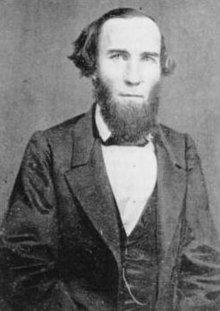L. P. Walker
| LeRoy Walker | |
|---|---|
 |
|
| 1st Confederate States Secretary of War | |
|
In office February 25, 1861 – September 16, 1861 |
|
| President | Jefferson Davis |
| Preceded by | Position established |
| Succeeded by | Judah Benjamin |
| Personal details | |
| Born |
February 7, 1817 Huntsville, Alabama, U.S. |
| Died | August 23, 1884 (aged 67) Huntsville, Alabama, U.S. |
| Political party | Democratic |
| Alma mater |
University of Alabama, Tuscaloosa University of Virginia |
| Religion | Presbyterianism |
| Military service | |
| Allegiance |
|
| Service/branch |
|
| Years of service | 1861–1862, 1864–1865 |
| Rank |
|
| Battles/wars | American Civil War |
LeRoy Pope Walker (February 7, 1817 – August 23, 1884) was the first Confederate States Secretary of War.
Walker was born near Huntsville, Alabama in 1817, the son of John Williams Walker and Matilda Pope, and a grandson of LeRoy Pope. He was educated by private tutors, then attended universities in Alabama and Virginia. Before reaching the age of 21, he was admitted to the bar. He married Eliza Dickson Pickett on July 29, 1850. He held various offices in Alabama; in 1853, he resigned his position as a circuit court judge in order to focus on his legal practice. He actively promoted secession.
Largely on the advice of several of Walker's supporters, including his brother Richard, President Jefferson Davis appointed him to the post of Secretary of War, though Walker was not personally known to Davis. He was energetic and confident in support of the Confederacy, but had no military training. The stress and difficulties of his cabinet position seriously affected his health. In March 1861, the Southern states that had seceded from the Union appointed special commissioners to travel to those other Southern states that had yet to secede. Walker was chosen as the commissioner from Alabama to the Tennessee Secession Convention, where he publicly read Alabama's Articles of Secession and tried to persuade Tennessee politicians to vote to do likewise.
In April 1861, shortly after the Civil War began with the bombardment of Fort Sumter by rebel forces, Walker predicted that Washington, D.C. and Boston would fall to the Confederacy before May 1 of that year. However, this never happened, and the last time that General Robert E. Lee's army ever invaded the North was his Pennsylvania Campaign, which ended at the Battle of Gettysburg, which the Union forces won. The Confederacy would never again attempt to invade the Union after that.
...
Wikipedia
